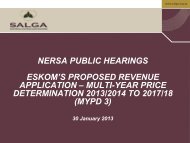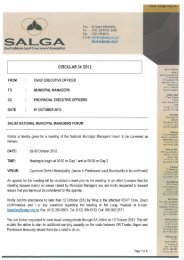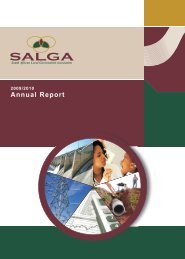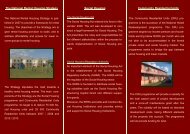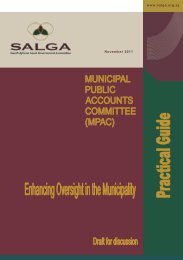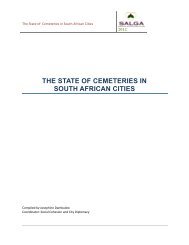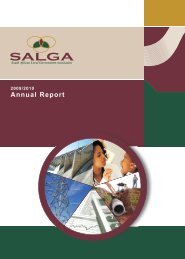Download - SALGA
Download - SALGA
Download - SALGA
- No tags were found...
You also want an ePaper? Increase the reach of your titles
YUMPU automatically turns print PDFs into web optimized ePapers that Google loves.
the Directorate of Economic Development and Planning. ICT in<br />
terms of local government is handled by the Directorate of Economic<br />
Development and Planning. As highlighted in <strong>SALGA</strong>’s 2009 State<br />
of ICT in Local Government report, modern cities in this new social<br />
and economic environment are reassessing their roles and capacities<br />
in relation to the emerging new knowledge-based economy and the<br />
needs of their citizens. To this end, towns and villages are able to<br />
access a variety of Information and Communication Technologies to<br />
better prepare citizens to compete in the new economy and aid in<br />
the delivery of public services, support enterprise development and<br />
enhance the quality of life in their communities. The application of<br />
ICTs therefore lies both within good governance as well as within the<br />
field of socio-economic development, and legislative and political<br />
measures are often required to facilitate or enable application of ICTs,<br />
especially in the successful delivery of e-Government services. At the<br />
2010 <strong>SALGA</strong> National Members Assembly, it was recognised that ICTs<br />
should be better leveraged to enable effective administration, service<br />
delivery and socio-economic development and are therefore integral to<br />
the functioning of any well run municipality. Raising the political and<br />
actual profile of ICT within local authorities, down to the community<br />
level, was given a high priority and <strong>SALGA</strong> is to be mandated and<br />
capacitated to be an effective coordinator and champion in driving for<br />
more effective use of ICTs for and in local government. The focus of<br />
ICT in the directorate falls within four broad critical focus areas:<br />
• Internal ICT systems, processes and infrastructure.<br />
• Broadband connectivity and access.<br />
• e-Government and provision of services.<br />
• Awareness of ICTs and the capacity of communities to engage<br />
and participate.<br />
An action plan for <strong>SALGA</strong>’s ICT agenda was drafted, highlighting the<br />
implementation of four flagships projects, namely: a Department of<br />
Communications Memorandum of Understanding (MOU) on e-Skills,<br />
the activation of the ICT Practitioners Network, the formation of<br />
a <strong>SALGA</strong> National ICT Local Government event and a study on the<br />
feasibility of <strong>SALGA</strong> forming an ICT accreditation service. Broadly, the<br />
ICT project is intended to provide support to municipalities to access<br />
information technology more conveniently, with the cost benefit aiding<br />
in the improvement of local government business processes through<br />
service delivery in areas such as debtor management, customer<br />
service, information distribution and revenue collection. <strong>SALGA</strong><br />
Northern Cape and Mpumalanga were identified as e-skilling pilot<br />
provinces and a one-day e-skilling workshop was held on 01 June<br />
2011 for five municipalities from Northern Cape Province, namely<br />
Gasegonyana, Emthanjeni, Sol Plaatje, NamaKhoi and Khara Hais.<br />
The workshop gave the municipalities an opportunity to present local<br />
government challenges and contribute significantly to the National<br />
e-Skills Plan of Action, as well as to formulate the key actions required<br />
to progress e-skills in the region.<br />
Position paper on Economic Development and Planning<br />
<strong>SALGA</strong> Eastern Cape identified the municipalities not having land<br />
use management and zoning plans, spatial development frameworks<br />
(SD)’s, land reform and settlement plans (LRSPs) and housing<br />
development plans and will hold workshops for key departments in<br />
order to support municipalities in this regard over the next financial<br />
year. <strong>SALGA</strong> Eastern Cape also participated in a local economic<br />
development (LED) maturity assessment workshop and hosted a LED<br />
roundtable to share the successes and failures of the provincial LED<br />
activities so as to improve coordination of initiatives and contribute<br />
to the stimulation of local economies and poverty alleviation in the<br />
province. <strong>SALGA</strong> North West convened and facilitated two provincial<br />
LED position paper sessions to solicit inputs and comments from all<br />
stakeholders (submitted in 2010), and also convened and participated<br />
in LED maturity assessment workshops to aid municipalities in<br />
developing their state of maturity in terms of LED good practice and<br />
benchmarking. Further, a provincial desktop assessment study on<br />
spatial planning and land-use management capacity and functionality<br />
was conducted with municipal town planning units, revealing that<br />
only ten of the 24 provincial municipalities possessed functional town<br />
planning units. A Comprehensive Rural Development Programme<br />
(CRDP) working session was then convened to assist municipalities<br />
on the comprehension of the programme and the different financial<br />
and technical avenues available.<br />
Providing support for the development of credible LED strategies<br />
<strong>SALGA</strong> Free State conducted an analysis of LED strategies in the<br />
province as well as the implementation of such in the municipalities,<br />
with leading practices being identified and documented as case<br />
studies to assist municipalities in improving the development of<br />
credible future LED strategies. These case studies will empower<br />
municipalities to draft their LED strategies in line with the development<br />
goals of the integrated development plan (IDP) of the current cycle<br />
to create growth and employment creation in the province. In this<br />
regard, <strong>SALGA</strong> Limpopo facilitated the partnering of institutions of<br />
higher learning with participating municipalities in the province.<br />
After development of an implementation plan and the submission<br />
of a proposal for Maruleng Municipality, a fresh-produce market<br />
was established and jobs created globally for market farmers.<br />
Additionally, Vhembe District Municipality was partnered with Rajkot<br />
District (Gondal Local Municipality in Gujurat, India) and enabled job<br />
creation through rural development focused primarily on agriculture.<br />
<strong>SALGA</strong> Mpumalanga conducted an analysis of LED strategies and<br />
implementation in member municipalities, holding a number of<br />
meetings with Emakhazeni, Emalahleni, Dr JS Moroka and Nkangala<br />
Municipalities on 18 Feb 2011. Letters of advice were disseminated to<br />
<strong>SALGA</strong> Annual Report | 2010/11<br />
39




